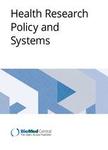版权所有:内蒙古大学图书馆 技术提供:维普资讯• 智图
内蒙古自治区呼和浩特市赛罕区大学西街235号 邮编: 010021

作者机构:UCL Dartington Serv Design Lab London England Dartington Serv Design Lab Buckfastleigh England Washington Univ St Louis Brown Sch St Louis MO USA UCL London England
出 版 物:《HEALTH RESEARCH POLICY AND SYSTEMS》 (Health Res. Policy Syst.)
年 卷 期:2025年第23卷第1期
页 面:1-15页
核心收录:
学科分类:12[管理学] 1204[管理学-公共管理] 120402[管理学-社会医学与卫生事业管理(可授管理学、医学学位)] 1004[医学-公共卫生与预防医学(可授医学、理学学位)] 10[医学]
主 题:Mental health Children and young people Community-based system dynamics Human-centred design Social determinants Place-based
摘 要:BackgroundThe deteriorating mental health of children and young people in the United Kingdom poses a challenge that services and policy makers have found difficult to tackle. Kailo responds to this issue with a community-based participatory and systemically informed strategy, perceiving mental health and well-being as a dynamic state shaped by the interplay of broader health determinants. The initiative works to explore, define and implement locally relevant solutions to challenges shaping the mental health and well-being of young people. Kailo unfolds in three stages within each locale. These stages encompass: early discovery, deeper discovery and co-design and implementation. This document delves into the participatory group model building and design protocol occurring in the deeper discovery and co-design stage of the *** methods, such as group model building, are effective in articulating and building consensus on complex issues like the social determinants of adolescent mental health. This paper describes the protocol for application of group model building within the Kailo design process to develop causal loop diagrams and pinpoint leverage points for improving adolescent mental health. It also suggests a method for considering modifications to delivery within a unique project context and in alignment with participants needs. This paper sets out to define the approach and clarify the objectives these engagements aim to fulfil. The method adapts existing group model building (GMB) protocols for use in a community setting. The engagements will involve groups of local young people and existing community members. To assess the success of the session s implementation post-delivery, the study utilizes existing frameworks for fidelity evaluations, which define a core and flex *** method described enables an integration of diverse local understandings of complex processes which provides a platform for creating co-desig